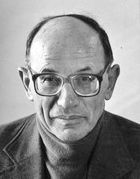 Edit article
Edit articleSeries
Deuteronomy: Religious Centralization or Decentralization?

Aerial view of Jerusalem. Wikimedia
For more than two centuries, most biblical scholars have understood cult centralization,[1] i.e., the requirement that all sacrifices be offered from one central Temple, as a prominent theme in Deuteronomy, one that drives much of its agenda.[2] Indeed Deuteronomy’s law collection (chs. 12-26) begins with the commandment to restrict sacrifices only to
דברים יב:ה כִּי אִם אֶל הַמָּקוֹם אֲשֶׁר יִבְחַר יְ־הוָה אֱלֹהֵיכֶם מִכָּל שִׁבְטֵיכֶם לָשׂוּם אֶת שְׁמוֹ שָׁם לְשִׁכְנוֹ תִדְרְשׁוּ וּבָאתָ שָׁמָּה.
Deut 12:5 But look only to the site that YHWH your God will choose amidst all your tribes as His habitation, to establish His name there. There you are to go.[3]

The late Israeli scholar Moshe Weinfeld (1925-2009), however, argued that the central cult is not the focus of the book’s religious program, which is, rather, observance of divine commandments.[4] In Deuteronomy, the covenant between God and Israel is maintained by Israel’s loyalty to God’s laws; worship at the temple plays only a supporting role.
Deuteronomy’s commandments hardly deal with sacrifices, but rather with day-to-day actions done at home, throughout the land God has given to Israel. Indeed, the chosen place is often contrasted with “your gates” (שעריך), a synecdoche for “towns.” For example, in the tithing laws (14:22-29), the standard tithe, to be eaten in the “place the Lord will choose,” is contrasted with the triennial tithe, to be made use of at home.[5]
Although Deuteronomy does have a number of laws that are Temple or Jerusalem focused, I would argue that, if anything, Deuteronomy’s interest is in downplaying Temple or cultic rules and emphasizing the day to day religious observance of the average Israelite.
Service of God
This emphasis on commandments, rather than cult, may also be seen in the book’s use of the root ע.ב.ד in the terms “service of the Lord ” or “to serve the Lord.”[6] In the other books of the Torah, these and similar terms from this root mainly refer to sacrificial/cultic duties. See especially Numbers 8:11, where the Levites are appointed ‘לעבד את עבדת ה “to do the service of the Lord,” and the repeated use of terms such as עבודת המשכן “Tabernacle service” and עבודת אהל מועד “Tent of Meeting service” in the Tabernacle laws in Exodus.
In Deuteronomy, however, the root ע.ב.ד generally refers to service of God through mitzvah observance.[7] For example:
דברים יא:יג וְהָיָה אִם שָׁמֹעַ תִּשְׁמְעוּ אֶל מִצְוֹתַי אֲשֶׁר אָנֹכִי מְצַוֶּה אֶתְכֶם הַיּוֹם לְאַהֲבָה אֶת יְ־הוָה אֱלֹהֵיכֶם וּלְעָבְדוֹ בְּכָל לְבַבְכֶם וּבְכָל נַפְשְׁכֶם.
Deut 11:13 If, then, you obey the commandments that I enjoin upon you this day, loving the Lord your God and serving Him (ולעבדו) with all your heart and soul.
דברים יג:ה אַחֲרֵי יְ־הוָה אֱלֹהֵיכֶם תֵּלֵכוּ וְאֹתוֹ תִירָאוּ וְאֶת מִצְוֹתָיו תִּשְׁמֹרוּ וּבְקֹלוֹ תִשְׁמָעוּ וְאֹתוֹ תַעֲבֹדוּ וּבוֹ תִדְבָּקוּן.
Deut 13:5 It is the Lord your God you shall follow, him alone you shall fear (תיראו), his commandments you shall keep, his voice you shall obey, him you shall serve (תעבדו), and to him you shall hold fast.
This reappropriation of a cultic term for obedience to God’s laws[8] is an indication that in Deuteronomy, obedience to God’s laws is more important than cultic centralization.
Limiting the Power of the Levite Priests
This downplaying of the cult may also be found in the book’s limiting the power of the cultic functionaries, the “Levite priests” (הכהנים הלוים). Although many scholars support the idea that Deuteronomy gives the priests special status, Weinfeld maintains that they are marginalized throughout the book.
His reasoning is based on to two factors. First, the term “Levite priests” erases the distinction, common in Priestly laws, between the priests descended from Aaron, and their assistants, the Levites.[9] Any priestly power that does exist in Deuteronomy is divided among as many people as possible – all Levite priests may serve in the Temple at will and receive equal shares in the sacrifices (Deut 18:6-8).[10]
Second, the Levites are often placed together with paupers in Deuteronomy. See especially 26:12-13, where the phrase “the Levites, the aliens, the orphans, and the widows” appears twice. This comparison serves as a rhetorical marginalization of the Levites, just as we have seen the entire cultic enterprise as marginalized in Deuteronomy.[11]
Secularization or Sacralization?

What is the significance of this marginalization? Weinfeld sees this as “secularization,” as it emphasizes aspects of everyday life, which is fundamentally secular, at the expense of the sacred Temple. But considering Deuteronomy’s emphasis on the covenantal relationship between God and Israel, I believe that the opposite opinion, voiced by German Catholic theologian and Bible scholar Norbert Lohfink, is preferable. Lohfink argues that this phenomenon is better understood as a process of sacralization of everyday life.
By emphasizing law over cult, average Israelites find themselves governed by the commandments in their day to day existence.[12] Instead of just the Temple being sacred and only the Levite priests serving God, the entire God-given land becomes sacred and all of Israel serves God. The Temple’s holiness then has merely a pragmatic function, as can be seen in the passage on tithing mentioned above (Deut 14:23) – it is a means of motivating the people to “fear God”, i.e. to obey the commandments,[13] likely by the shared significant religious experience of pilgrimage (cf. Rashbam ad loc.).

I am similarly sympathetic to the Canadian Bible scholar William Morrow’s understanding that Deuteronomy’s outlook reflects “laicization” rather than “secularization.”[14] In other words, in Deuteronomy the realm of the sacred becomes accessible to the laity by means of the commandments and the covenant, while the priests themselves are limited to an auxiliary role.
Two Core Aspects of Deuteronomic Thought
These processes of sacralization and laicization highlight two important aspects of Deuteronomic thought.
First, they push forward the individual Israelites’ enhanced status, at the expense of the priests. God’s covenant is with the nation as a whole, not only with its leaders. Israeli scholar Joshua Berman has shown this convincingly regarding the book’s political view,[15] but this is true, as we have seen, regarding religion as well.
Second, these processes highlight the significance of obedience to God and observance of commandments as opposed to ritual or cultic practices.[16] Since, according to Deuteronomy, performance of mitzvot is primary, then the sacred space in which God will be served is the holy land as a whole.[17] Deuteronomy makes this clear with Moses’ words in the introductory verse to Deuteronomy’s law collection:
דברים יב:א אֵלֶּה הַחֻקִּים וְהַמִּשְׁפָּטִים אֲשֶׁר תִּשְׁמְרוּן לַעֲשׂוֹת בָּאָרֶץ אֲשֶׁר נָתַן יְ־הוָה אֱלֹהֵי אֲבֹתֶיךָ לְךָ לְרִשְׁתָּהּ כָּל הַיָּמִים אֲשֶׁר אַתֶּם חַיִּים עַל הָאֲדָמָה.
Deut 12:1 These are the statutes and ordinances that you must diligently observe in the land that the Lord, God of your ancestors, is giving you to possess, as long as you live on earth.
In short, rather than strengthening the Temple cult, Deuteronomy actually weakens it, while strengthening the religious value of the nation of Israel and its covenant with God, and observance of God’s mitzvot, which takes place throughout the entire land, not just in the Temple.
TheTorah.com is a 501(c)(3) nonprofit organization.
We rely on the support of readers like you. Please support us.
Published
August 17, 2014
|
Last Updated
January 29, 2026
Previous in the Series
Next in the Series
Before you continue...
Thank you to all our readers who offered their year-end support.
Please help TheTorah.com get off to a strong start in 2025.
Footnotes

Dr. Baruch Alster teaches Bible at Givat Washington College in Israel. He received his Ph.D. from Bar Ilan University in 2007, writing his dissertation on the history of Jewish interpretation of the Song of Songs. He has published articles on various aspects of the Bible and the history of Jewish exegesis, and is currently working on a critical edition of a medieval French commentary on the Megillot.
Essays on Related Topics:









